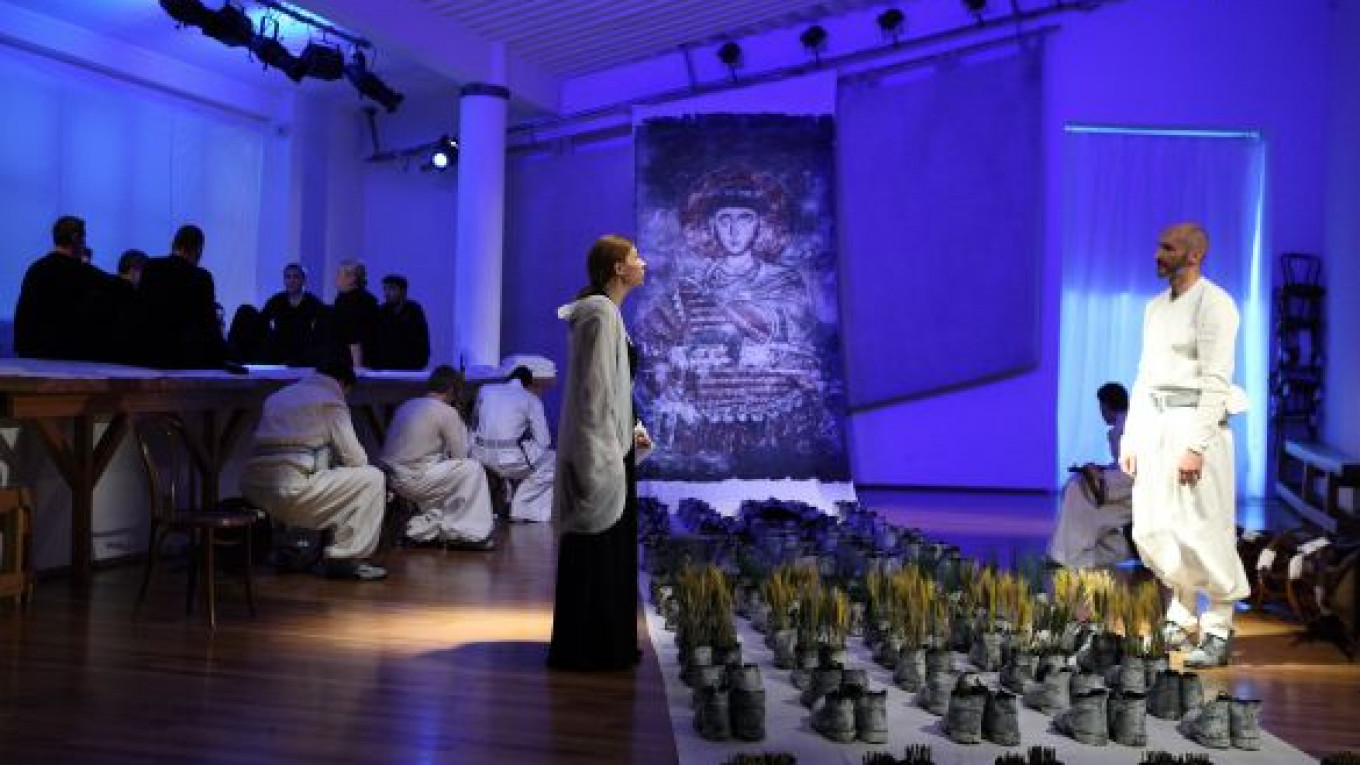Alexei Dudarev's play "The Privates" appeared in 1985 on the 40th anniversary of the end of World War II. The tale, about a small group of soldiers living out the final days of the conflict, was hugely popular throughout the Soviet Union. In Moscow it played at the Maly Theater and in Leningrad at the Bolshoi Drama Theater.
After several decades of obscurity, the play has been brought back by Alexander Lapty under the title "Song of Swans" or "Cantus Cycneus" at the School of Dramatic Art. This revival coincided more or less with the 72nd anniversary of the beginning of the war.
As long as we're tossing numbers around, let's add this: it has been 28 years since this play first appeared. That's not 40 or 72 years, but it's still a long time now matter how you measure it.
That passage of time is strikingly evident in Lapty's production. The language and the style of the play's construction nowadays look like artifacts from an ancient, forgotten age.
I hardly remember the last time I heard characters in a theater speak like these soldiers do. The epithets that come to mind immediately are "stilted," "manufactured" and "old-fashioned." Most of the time we don't feel as though individuals are engaging in conversation, but rather that a not-so-hidden author is preaching ideas and delivering information to us in a florid, literary style.
Aside from the characters' diction there are also the events and situations that arise. The author apparently desired to have such compassion for his creations that he even made their flaws into heroic deeds.
Dugin, the company commander, is investigated by the brass for having faked his death and burial in a mass, unmarked grave. The suspicion on the part of his superiors is that he is preparing to flee across the front to the West. Instead, it turns out that a war wound destroyed Dugin's chances of having children, and he chose valiantly to set his wife free to find another husband and father for her future children without the hindrance of his presence.
Some of the characters have little flaws, of course. Dugin, as played by Lapty, is rather hot-headed and is not averse to chewing out a subordinate. He does, however, have a big heart and a strong sense of justice.
Dugin is terribly angry with the young Matvei (Kirill Fyodorov) for refusing to shoot at the enemy because the Lord has commanded him not to kill, but he is even angrier at the unhinged Bushtets (Ivan Tovmasyan) for threatening Matvei physically over this incident. And when Dugin realizes that the group's youngest soldier, Dandelion (Fyodor Leonov), might be killed in battle, he sends him away to protect him.
The gradations of high-minded virtue just keep rising higher with each passing moment.
There is, as was true in most generic Soviet plays, a wise "old man" who keeps his cool in all circumstances and who knows evil cannot be defeated actively, but only by quietly willing good on anything and everyone. Dudarev handed this function to a character named Dervoyed, whom everyone affectionately calls Gramps.
Igor Lesov breathes life into Dervoyed by following well the character's own philosophy. His low-key, soft-spoken performance oozes tolerance and wisdom and provides the audience with some of the more believable scenes in this production.
Lapty does not attempt to create a realistic picture of Dudarev's play. He cut many of the play's most maudlin, sentimental scenes, replacing them with solemn or sarcastic songs performed by a small choir that remains on stage at all times. Viktoria Khlebnikova's beautiful design is anything but a common war setting.
A long column made up of dozens of boots runs nearly from the front row of seats all the way back to the back wall of the stage. Some are filled with dirt, others have dead straw or live grass "growing" from them. Some are merely empty. It is an effective visual image conjuring up the notion of soldiers going off to war and not coming back.
The soldiers are all dressed in bright white costumes, as if they were angels. The choir is decked out in black, perhaps representing those who have died and passed on to another world.
Lapty has mounted an attractive and intriguing production of this old play. But this old play is deeply rooted in another era, another style, and another mentality. I suspect it was forgotten after the 1980s for good reason.
"Song of Swans" plays Sat. at 8 p.m. on the Tao Hall stage at the School of Dramatic Art, 19 Sretenka Ulitsa. Metro Sukharevskaya. Tel. 495-632-9344. sdart.ru. Running time: 1 hour.
Contact the author at jfreedman@imedia.ru
A Message from The Moscow Times:
Dear readers,
We are facing unprecedented challenges. Russia's Prosecutor General's Office has designated The Moscow Times as an "undesirable" organization, criminalizing our work and putting our staff at risk of prosecution. This follows our earlier unjust labeling as a "foreign agent."
These actions are direct attempts to silence independent journalism in Russia. The authorities claim our work "discredits the decisions of the Russian leadership." We see things differently: we strive to provide accurate, unbiased reporting on Russia.
We, the journalists of The Moscow Times, refuse to be silenced. But to continue our work, we need your help.
Your support, no matter how small, makes a world of difference. If you can, please support us monthly starting from just $2. It's quick to set up, and every contribution makes a significant impact.
By supporting The Moscow Times, you're defending open, independent journalism in the face of repression. Thank you for standing with us.
Remind me later.


